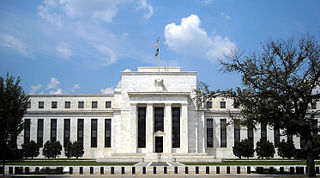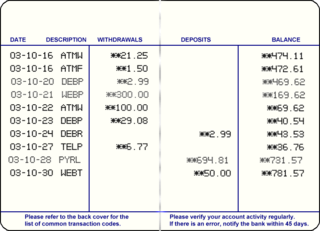Related Research Articles

Islamic banking, Islamic finance, or Sharia-compliant finance is banking or financing activity that complies with Sharia and its practical application through the development of Islamic economics. Some of the modes of Islamic finance include mudarabah, wadiah (safekeeping), musharaka, murabahah (cost-plus), and ijarah (leasing).
An interest rate is the amount of interest due per period, as a proportion of the amount lent, deposited, or borrowed. The total interest on an amount lent or borrowed depends on the principal sum, the interest rate, the compounding frequency, and the length of time over which it is lent, deposited, or borrowed.

The monetary policy of the United States is the set of policies which the Federal Reserve follows to achieve its twin objectives of high employment and stable inflation.

In macroeconomics, money supply refers to the total volume of money held by the public at a particular point in time. There are several ways to define "money", but standard measures usually include currency in circulation and demand deposits. Money supply data is recorded and published, usually by the national statistical agency or the central bank of the country. Empirical money supply measures are usually named M1, M2, M3, etc., according to how wide a definition of money they embrace. The precise definitions vary from country to country, in part depending on national financial institutional traditions.
The money market is a component of the economy that provides short-term funds. The money market deals in short-term loans, generally for a period of a year or less.

Fractional-reserve banking is the system of banking in all countries worldwide, under which banks that take deposits from the public keep only part of their deposit liabilities in liquid assets as a reserve, typically lending the remainder to borrowers. Bank reserves are held as cash in the bank or as balances in the bank's account at the central bank. Fractional-reserve banking differs from the hypothetical alternative model, full-reserve banking, in which banks would keep all depositor funds on hand as reserves.

Yorkshire Bank is a trading name used by Clydesdale Bank plc for its retail banking operations in England.
Reserve requirements are central bank regulations that set the minimum amount that a commercial bank must hold in liquid assets. This minimum amount, commonly referred to as the commercial bank's reserve, is generally determined by the central bank on the basis of a specified proportion of deposit liabilities of the bank. This rate is commonly referred to as the cash reserve ratio or shortened as reserve ratio. Though the definitions vary, the commercial bank's reserves normally consist of cash held by the bank and stored physically in the bank vault, plus the amount of the bank's balance in that bank's account with the central bank. A bank is at liberty to hold in reserve sums above this minimum requirement, commonly referred to as excess reserves.

A savings account is a bank account at a retail bank. Common features include a limited number of withdrawals, a lack of cheque and linked debit card facilities, limited transfer options and the inability to be overdrawn. Traditionally, transactions on savings accounts were widely recorded in a passbook, and were sometimes called passbook savings accounts, and bank statements were not provided; however, currently such transactions are commonly recorded electronically and accessible online.

Money creation, or money issuance, is the process by which the money supply of a country, or an economic or monetary region, is increased. In most modern economies, money is created by both central banks and commercial banks. Money issued by central banks is a liability, typically called reserve deposits, and is only available for use by central bank account holders, which are generally large commercial banks and foreign central banks.

The Depository Institutions Deregulation and Monetary Control Act of 1980 is a United States federal financial statute passed in 1980 and signed by President Jimmy Carter on March 31. It gave the Federal Reserve greater control over non-member banks.
Triodos Bank N.V. is an ethical bank based in the Netherlands with many branches in Belgium, Germany, United Kingdom, and Spain. It was founded in 1980.
Modern monetary theory or modern money theory (MMT) is a heterodox macroeconomic theory that describes currency as a public monopoly and unemployment as evidence that a currency monopolist is overly restricting the supply of the financial assets needed to pay taxes and satisfy savings desires. According to MMT, governments do not need to worry about accumulating debt since they can pay interest by printing money. MMT argues that the primary risk once the economy reaches full employment is inflation, which acts as the only constraint on spending. MMT also argues that inflation can be controlled by increasing taxes on everyone, to reduce the spending capacity of the private sector.

An ethical bank, also known as a social, alternative, civic, or sustainable bank, is a bank concerned with the social and environmental impacts of its investments and loans. The ethical banking movement includes: ethical investment, impact investment, socially responsible investment, corporate social responsibility, and is also related to such movements as the fair trade movement, ethical consumerism, and social enterprise.
China's banking sector had CN¥417 trillion in assets at the end of 2023. The "Big Four" state-owned commercial banks are the Bank of China, the China Construction Bank, the Industrial and Commercial Bank of China, and the Agricultural Bank of China, all of which are among the largest banks in the world as of 2018. Other notable big and also the largest banks in the world are China Merchants Bank and Ping An Bank.

A bank is a financial institution that accepts deposits from the public and creates a demand deposit while simultaneously making loans, mobilising saver surplus to deficit spenders. Lending activities can be directly performed by the bank or indirectly through capital markets.
United Kingdom banking law refers to banking law in the United Kingdom, to control the activities of banks.
Social enterprise lending is a form of social finance which refers to the practice of offering loans and other financing vehicles below current market rates to social enterprises and other organisations pursuing social goals. This is often referred to as "patient lending," or financing with "soft" terms. Patient lending recognises that projects with social outcomes often reach profitability later than commercial projects. Softening the terms of a loan means that a social lender may offer provisions such as longer loan terms, lower interest rates and repayment "holidays" where capital and interest repayments are not due until the project is profitable. Social lenders might also offer small grants as part of an investment package.
Vancouver City Savings Credit Union, commonly referred to as Vancity, is a member-owned financial co-operative headquartered in Vancouver, British Columbia, Canada. By asset size, Vancity is the largest community credit union in Canada as of 2019, with CA$28.2 billion in assets plus assets under administration, 60 branches and more than 543,000 members.
A fixed deposit (FD) is a tenured deposit account provided by banks or non-bank financial institutions which provides investors a higher rate of interest than a regular savings account, until the given maturity date. It may or may not require the creation of a separate account. The term fixed deposit is most commonly used in India and the United States. It is known as a term deposit or time deposit in Canada, Australia, New Zealand, and as a bond in the United Kingdom.
References
- 1 2 "Banking on People", British Universities Film & Video Council
- ↑ Andrew Bibby, "Ethical bank updates its homespun style", The Independent, 5 June 1993
- ↑ John Osmond (1986). Work in the Future: Alternatives to Unemployment. Thorsons Publishing Group. p. 107. ISBN 978-0-7225-1245-6.
- 1 2 James Lynch (1994). Banking and Finance: Managing the Moral Dimension. Gresham Books. p. 100. ISBN 1-85573-176-2.
- ↑ Christopher Schaefer; Tijno Voors (1996). Vision in Action: Working with Soul & Spirit in Small Organizations. SteinerBooks. pp. 134–5. ISBN 978-0-940262-74-4.
- 1 2 Alan Lewis; Karl-Erik Wärneryd (8 January 2002). Ethics and Economic Affairs. Routledge. p. 181. ISBN 978-1-134-86972-5.
- 1 2 New Statesman Society. Vol. 7. Statesman & Nation Publishing Company Limited. October 1994. p. 15.
- 1 2 Paul Gosling, "Ethical banks to merge", The Independent, 30 January 1994
- ↑ The Ecologist. Vol. 18. Ecosystems Limited. 1988. p. 53.